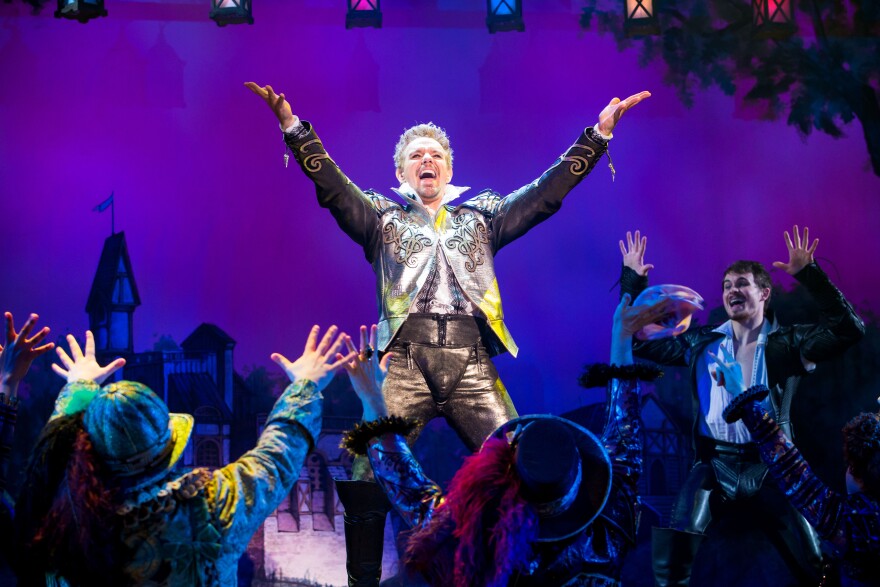Brothers Wayne and Karey Kirkpatrick think musicals are a little absurd, so they wrote the parody, “Something Rotten!”; six women have filed a lawsuit against Harvey Weinstein and they're seeking class action status; Cornerstone marks its 25th year in L.A. with the culmination of an eight-play cycle.
Cornerstone marks 25 years in LA with 'The Magic Fruit'
For the past six years, L.A.'s Cornerstone Theater Company has investigated what it means to be hungry — and we aren’t just talking about food.
The troupe created eight new plays with eight local communities, each trying to satisfy a different type of hunger. Former gang members hoping to start new lives. Homeless people seeking shelter. School lunch ladies looking to serve healthier food. Each story explores what it means to be malnourished in some way.
Now, Cornerstone is bridging all the plays and community groups into a new show, "The Magic Fruit," aiming to tell a larger story.
To mark the company’s 25th anniversary in Los Angeles, artistic director Michael John Garces adapted Mozart’s opera and set it in a post-apocalyptic L.A.

"It felt to me that something like 'Magic Flute' would be an inspiration to write a play that allowed for lyrical lightness, love and celebration, as well as some real darkness," Garces said.
Stage manager Nikki Hyde loves it whenever new people join the cast of a Cornerstone production, but this one is special because it’s a "bridge show."
"Community members come in with this excitement, it’s like doing something for the first time," Hyde says. "And there’s certain people who are just like, ‘Oh yeah! I know what a cue light is! (Laughs) Oh yeah! I have all this make up I can use!'"
Every Cornerstone show is a mix of professional actors and people who have never stepped on a stage but belong to the group featured in the story.

"The Magic Fruit" tells the story of Tami, an ex-gang member, who fights drought, addiction and poverty to save the world and get back to her family. But the Queen of the Rain, played by Cornerstone veteran Page Leong, makes trouble for her.
After years of exploring the topic of hunger on stage, Leong discovered she can grow a garden. In fact, her backyard is full of banana trees.
"I always thought [gardening] was something other people could achieve. It’s grounded me so much. It’s connected me to my land," Leong said.
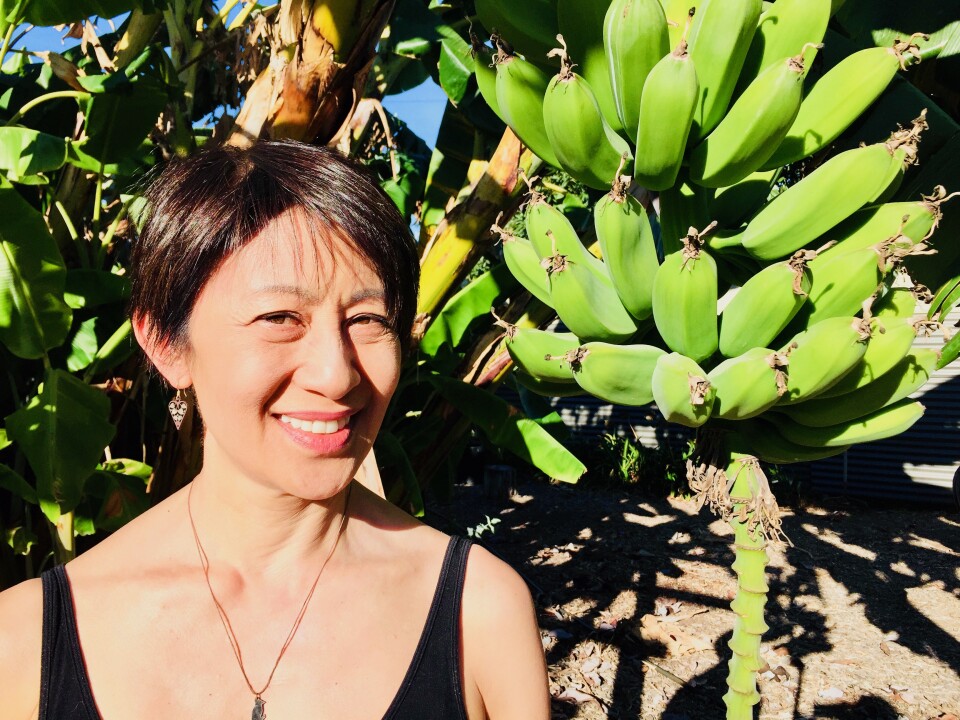
Creating connections — between people, places and common problems — is Cornerstone's magic fruit.
The company was formed in 1986 by a group of Harvard students who wanted to use theater as a tool for social change.
The seed was planted when a young playwright named Alison Carey bumped into an emerging director named Bill Rauch at the Harvard Bookstore. Rauch was looking for the theater books. Carey showed him the way. Eventually, they decided they would work together.
"We’d heard a really damning statistic in college that only two percent of American people went to professional theater on anything approaching a regular basis," Rauch said. "And we were really freaked out that even if we were lucky enough to be successful in our careers, we would not be in touch with 98 percent of our fellow citizens. And that was really disturbing."
After graduating from Harvard, they packed their possessions into a big blue van and hit the road, taking theater to the other 98 percent, mostly in rural America.
They staged adaptations of classic works by Shakespeare and Moliere. The shows were often well-received but sometimes there was pushback, according to Rauch’s husband and original Cornerstone member, Christopher Liam Moore.
"One of the most profound lessons we learned in 1987," Moore says. "We went to Norcatur, Kansas, which is a small farming town in the northwest corner of Kansas. We were doing Moliere’s 'Tartuffe,' which is about religion."
While the company members wanted to re-tell Moliere’s religious tale through the lens of controversial modern-day TV evangelists like Jimmy Swaggart and Jim Baker, many of the family farms in Norcatur were facing foreclosure. They didn’t care about Cornerstone's play.
"It was a real splash of cold water to realize we came to this community with an idea of what we wanted to do and what we wanted to say artistically,” Moore recalls. “We listened to the community and the community told us, 'That’s not what we care about.' The religious part of it became almost secondary. Because we were willing to say, 'Oh, right — maybe our idea is not the best one.' Maybe the community’s idea is a better one. To say, 'What is the story that needs to be told in your community right now?'"
The company spent six years creating community-specific plays across rural America. Moore says it was magical but troupe members wanted a place to call home.
They considered Washington D.C. and Los Angeles. What tipped the scale? NPR host Peter Sagal.

The host of "Wait, Wait, Don’t Tell Me" attended Harvard with several original Cornerstone members. He was — and still is — a working playwright. And he was living the artist’s life in L.A.
Rauch and Moore, would occasionally stay at Sagal’s Silver Lake pad.
"I remember Bill saying to me, 'My mail is still going to my parents house. I have to move somewhere,'" Sagal said.
Sagal says he told them that if they came to L.A., they could find a thousand of underserved communities, all reachable by freeway.
The year was 1992 and Los Angeles was about to burn.
Rauch believes the racial strife revealed by the L.A. riots validated the young theater company’s hunch that they had a purpose here. They called on Sagal to help create Cornerstone’s first L.A. production, an adaption of the 1,600-year-old Sanskrit play "The Clay Cart."
"At the end of the piece, all of the actors sort of intoned a prayer for the future of Los Angeles," Sagal said. "That there would be peace. homes for the homeless. kindness for the cruel. I can remember being very moved by that."
Twenty-five years later, "The Magic Fruit" offers a similar message of hope, health and humanity.
"As a young gay kid, I felt safety and hope and potential for community in theater in a way that I didn’t feel in any other form of expression," Rauch said.
When he still in junior high, Rauch went on a field trip to see Alvin Epstein’s staging of "A Midsummer Night's Dream."
"I saw it and then I did my own adaptation in contemporary English because I wanted my classmates to understand it better. I just put it in my own language. I would give anything to be able to find that version. I always hope it will show up in a box somewhere," Rauch said.
Shishir Kurup also found theater at a young age. He's the director of "The Magic Fruit" and a longtime Cornerstone member.
Hios desire to create accessible art with diverse communities can also be traced to his childhood. He grew up in Mombassa, Kenya in a part of the city with radically different neighborhoods — some fancy, some scary. He visited all of them without fear or hesitation.
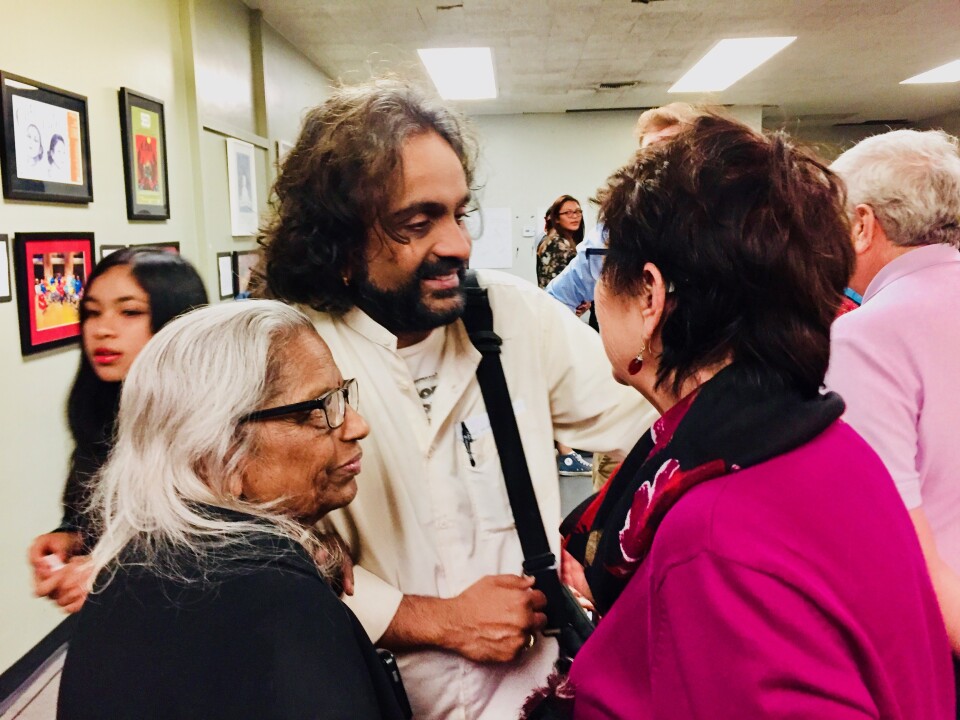
"It was all really romantic for a kid. Joining and working with Cornerstone was like me re-engineering all the communities I went into as a kid," Kurup said.
Kurup's boldness comes in handy at Cornerstone. He remembers working in Watts when the local police took him by surprise and warned the company members to be very careful.
“They sat [us] down and said, 'Listen, if you come up to a stop sign and somebody starts walking to your car, just drive away from there! And we [thought], Why are you trying to scare us?'"
Kurup says his attitude was: "We are going to meet the people, because when we meet the people on the ground, they are just like us and we are just like them.”
Anytime Kurup makes the traffic-choked commute from his West L.A. home to Cornerstone’s downtown space, he remembers why his journey to direct "The Magic Fruit" has taken 25 years.
“When I do drive, I [think], 'Oh, we did that play over there.' Or, 'We did this thing over there.' And, 'Oh, do you know who lives there? I wonder if they are still there anymore.' It’s made the city my city, like my home."
"The Magic Fruit" runs through Dec. 10 at the Shakespeare Center of L.A. In classic Cornerstone tradition, all performances are pay what you can.
'Something Rotten' creators poke fun at musicals while paying tribute
Brothers Wayne and Karey Kirkpatrick always wanted to write a musical.
Wayne is a Nashville-based songwriter who has written hits for Garth Brooks and Faith Hill. And Karey is a screenwriter and director, known for the animated films “Over the Hedge” and “Chicken Run.”
They collaborated with author John O’Farrell and “Book of Mormon” choreographer Casey Nicholaw to create their first musical, “Something Rotten!" — a Renaissance farce that borrows more from rock ’n’ roll than it does from 16th century wigged composers.
It tells the story of Nick and Nigel Bottom, playwrights working in the shadow of William Shakespeare. And a prophecy, made by the less gifted nephew of Nostradamus, foretells the next big thing in theater — the musical.
“Something Rotten!” premiered on Broadway in 2015. John Horn met with Wayne and Karey Kirkpatrick a few days after the show opened at the Ahmanson Theater in Los Angeles.
Interview Highlights:
On what setting this story in the Renaissance afforded them creatively:
WAYNE: Imagining what it must have been like if we were living in that time and it was the modern equivalent of whatever we have today. Today we would sing about iPhones and computers. So they're talking about their modern inventions — the freezing of meat (laughs).
KAREY: Francis Bacon really was freezing chickens. And we had a joke that John [O’Farrell] and I wrote that there was an apple store — just a store where they sold apples – and everybody was lined up outside the apple store. Stuff like that. We love history. And we actually tried to stay as historically accurate as possible. Although, all of the writers that we're referencing from the Renaissance — this is set in 1595 — they were of various ages. So we take some liberties.
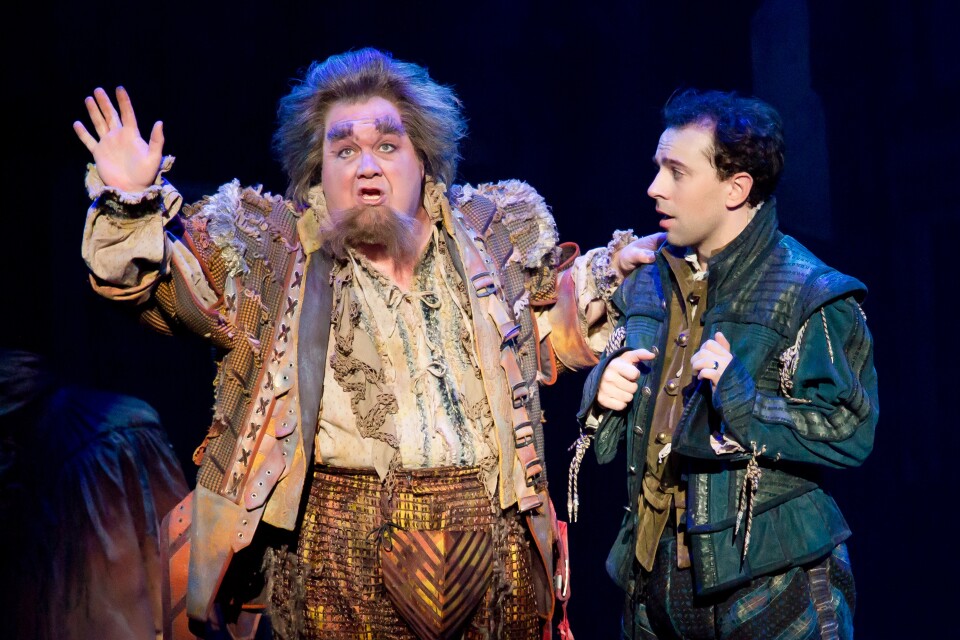
On the contributions of choreographer Casey Nicholaw:
KAREY: He was the perfect fit for this material.
WAYNE: He was really a fourth collaborator. The show was a work-in-progress. When he came on board, we didn't have a completed book or all of the songs yet. It was still being formulated. Him being a seasoned Broadway veteran helped guide us through the murky waters.
KAREY: He has Broadway structure in his blood. He understands better than anyone that I've met what should happen when in a musical. We wrote over 50 songs for the piece. And to our credit, there weren't any bad songs — it was just songs that weren't right. He was the one pushing us, saying, I don't think you want this kind of song here. I think this needs to be an ensemble number.
WAYNE: He was, early on, responsible for how the number, "A Musical," became what it is. The early version of that song was a much more laid-back approach. His early note was, This is your moment to do a really big [number]! — which influenced writing a different chorus for that.
Listen to "A Musical":
On writing "A Musical":
A friend of ours, Jeanine Tesori, who's another Broadway composer, came and watched the show. And she wrapped it up in a way that I hadn't really thought of. She said, That song and that show pokes fun of the form while paying tribute to the form all in the same stroke. I was like, Oh, that's a nice way to put it. Because that's what we were trying to do. And that song, "A Musical," was an early one that we wrote that allowed us to go explore all the tropes and poke fun at it. Part of it is, I know people who hate musicals — my wife being one of them — and who have a hard time with the form. That just can't get past people bursting into song and it feels ridiculous to them. So that seemed like a great leaping off place for some comedy.
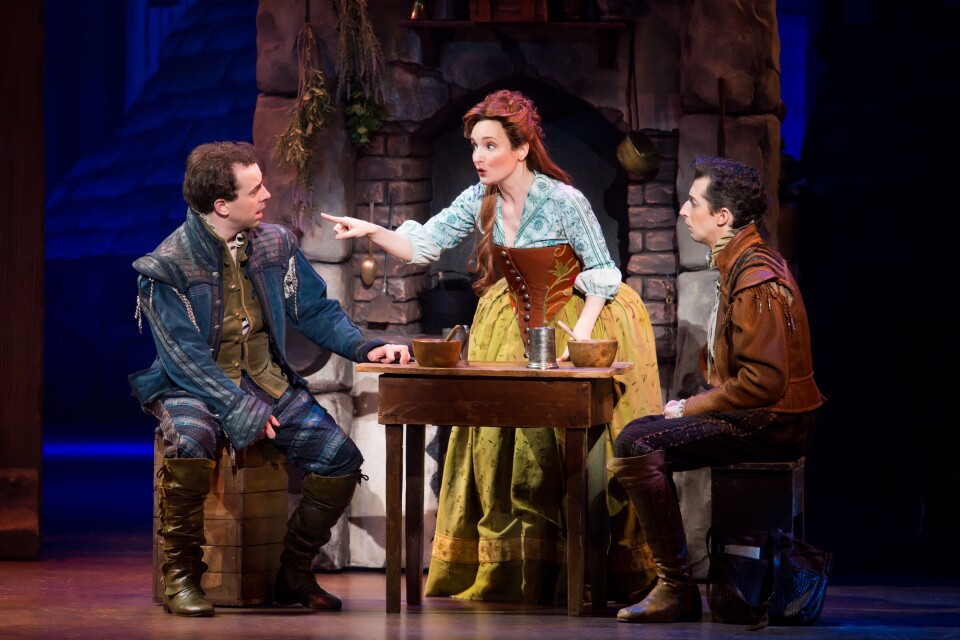
On the feminist undertones in the story:
We wrote the jokes about women — "This is the [15]90s," "We have a woman on the throne," "Women are going to be completely equal to men by the year 1600." This was all written pre-Hillary [Clinton] running for election. But when we were opening on Broadway, we were in the middle of all of that early election stuff. In fact, on one of our dark nights, they had a fundraiser for Hillary in the St. James Theater, so all of these jokes were landing in a way that made us feel like we were pimping out the topics of the day, but we weren't.
"Something Rotten!" is at the Ahmanson Theater through Dec. 31.



